- Home
- Josephine Tey
Brat Farrar Page 18
Brat Farrar Read online
Page 18
As he came level with the green clump of bushes and young trees that marked the old quarry, he found an old man sitting in its shelter eating solid slabs of bread and jam, and gave him a greeting as he passed.
"Proud, a'nt yu!" said the old man tartly.
Brat swung on his heel and stared.
"Wonderful dentical and Frenchy furrin parts makes folks, surely."
He took another large bite and surveyed Brat from under the battered felt of his hat.
"Dunnamany nests you'd never seen but fur me."
"Abel!" said Brat.
"Well, that's summat," said the old man grudgingly.
"Abel!" said Brat, and sat down beside him. "Am I glad to see you!"
"Adone do!" Abel said to his dog, who came out from under the spread of his coat to sniff at the newcomer.
"Abel!" He could hardly believe that yesterday's occupant of a newspaper morgue was here in the flesh.
Abel began to exhibit signs of gratification at this undoubted enthusiasm for his society, and allowed that he had recognised him afar off. "Lame, are yu?"
"Just a bit."
"Bruck?"
"Yes."
"Weren't never one to make a pucker," Abel said, approving his laconic acceptance of bad luck.
Brat propped his back against the stout wooden fencing that kept the sheep from the quarry face, took out his cigarette case, and settled down for the afternoon.
In the hour that followed he learned a great deal about Pat Ashby, but nothing that helped to explain his suicide. Like everyone else, old Abel had been shocked and surprised by the boy's death, and now felt that his disbelief in a suicidal Patrick had been vindicated.
Patrick "weren't never one to make a pucker," no matter how "tedious bad" things were.
The old shepherd walked with him to the beeches, and Brat stayed there and watched man and dog grow small in the distance. Long after they were indistinguishable he stayed there, soothed by the loneliness and the great «hush» of the wind in the beech trees. Then he followed them down into the green plain until he came to the path, and let it lead him back over the hill to Clare.
As he came down the north slope to the road, a familiar «clink-clink» came up to him on the wind. For a moment he was back on the Wilson ranch, with the forge glowing in the thin mountain air and-what was her name? — Cora waiting for him beyond the barn when he was tidied up after supper. Then he remembered where the forge was: in that cottage at the foot of the hill. It was early yet. He would go and see what an English smithy looked like.
It looked very like the Wilson one, when at last he stood in the doorway, except that the roof was a good deal lower. The smith was alone, his mate being no doubt an employee and subject to a rationing of labour, and he was fashioning horse-shoes. He looked up as Brat darkened the doorway, and gave him a greeting without pausing in his work. Brat watched him for a little in a companionable quiet, and then moved over to work the bellows for him. The man looked up and smiled. He finished what he was doing at the moment and then said: "I didn't know you against the light. I'm unaccountable glad to see you in my place again, Mr. Patrick."
"Thanks, Mr. Pilbeam."
"You're a deal handier with that thing than you used to be."
"I've earned my living at it since I saw you last."
"You have? Well, I'll be — !" He took a half-made shoe red-hot from the furnace and was about to resume work when he changed his mind and held it out with a grin to Brat. Brat accepted the challenge and made a good job of it, Mr. Pilbeam acting as mate with critical approval.
"Funny," he said, as Brat plunged the shoe into the water, "if any Ashby was to earn his living at this job it ought to have been your brother."
"Why?"
"You never showed much interest."
"And did Simon?"
"There was a time when I couldn't keep him out of this place. There wasn't anything he wasn't going to make, from a candlestick to gates for the avenue at Latchetts. Far as I remember, all he ever made was a sheep-crook, and that not over-well. But he was always round the place. It was a craze of his for the whole of a summer."
"Which summer was that?"
"Summer you left us, it was. I'd misremember about it, only he was here seeing us put an iron on a cartwheel the day you ran away. I had to shoo him home for his supper."
Brat considered the shoe he had made, while Mr. Pilbeam made ready to call it a day.
"I ought to hang that up," Mr. Pilbeam said, nodding at Brat's handiwork, "and label it: Made by Patrick Ashby of Latchetts. And I couldn't make a better one myself," he added handsomely.
"Give it to old Abel to nail on his door."
"Bless you, old Abel wouldn't have cold iron on his threshold. Keep his visitors away."
"Oh. Friendly with 'them, is he?"
"Do all his washing up and keep his house clean, if you'd believe all you hear."
"I wouldn't put it past him," Brat said. And set out for Latchetts.
So Simon had an alibi. Simon had been nowhere near the cliffs that afternoon. He had never been out of the Clare valley.
And so that was that.
On his way home up the ride between the paddocks he met Jane. Jane had every appearance of "hanging around," and he wondered if it was to intercept him that she lingered there. She was talking to Honey and her foal, and made no effort to efface herself as she had done hitherto at his approach.
"Hullo, Jane," he said, and joined in the intercourse with Honey to give her time. Her small pale face had flushed, and she was evidently struggling with a quite unusual emotion.
"It's about time we were going home to wash up," he suggested at last, as she seemed no nearer speech.
She dropped her hand from Honey's head and turned to face him, braced for effort.
"I wanted to say something to you. Do you mind?"
"Something you want me to do for you?"
"Oh, no. Nothing like that. It's just that I wasn't very nice to you when you came home from America, and I want to apologise."
"Oh, Jane," he said, wanting to take the small brave figure in his arms.
"It wasn't because I wanted to be horrid to you," she said, anxious that he should understand. "It was because-it was because — "
"I know why it was."
"Do you?"
"Yes, of course. It was a very natural thing to feel."
"Was it?"
"In fact, all things considered, it does you credit."
"Then you'll accept my apology?"
"I accept your apology," Brat said gravely, and they shook hands.
She did not immediately put her arm through his as Ruth would have done. She walked beside him in a grown-up fashion, talking politely about the chances of Honey's foal in the market, and what it should be called. The matter of the name was such an absorbing and exciting one that presently she forgot her self-consciousness, so that by the time they reached the house she was chattering unreservedly.
As they crossed the wide gravel sweep, Bee came to the door and stood there watching them come.
"You are going to be late for dinner, you two," she said.
22
So Brat took possession of Latchetts and of everyone in it, with the exception of Simon.
He went to church on Sunday and submitted to being stared at for an hour and a half with time off for prayers. The only people not in Clare Church that morning were the Nonconformists and three children who had measles. Indeed, there were, as Bee pointed out, several members of the congregation whose normal place of Sunday worship was the blue brick barn at the other end of the village, and who had decided to put up with ritual and prelacy this once in order to share in the sensation of his appearance. As for the orthodox flock, there were individuals there, Bee said, who had not entered a church since their last child was christened. There was even Lana Adams who, as far as anyone knew, had not been in any church since her own baptism in the blue brick barn some twenty years ago.
Brat sat between Bee and Ele
anor, and Simon on the other side of Bee. The twins were beyond Eleanor; Ruth wallowing in the drama and singing hymns loudly with a rapt expression, and Jane looking at the congregation with stony disapproval. Brat read the Ashby tablets over and over again, and listened to the Rector's unemphatic voice providing the inhabitants of Clare with their weekly ration of the abstract. The Rector did not preach, in the accepted meaning of the term. He sounded as if he were arguing the matter out for himself; so that, if you shut your eyes, you could be in a chair at the other side of the Rectory fireplace listening to him talk. Brat thought of the fine variety of preachers who had come to take Sunday service at the orphanage: the shouters, the between-you-and-me-ers, the drama merchants who varied their tones and dropped their voices like amateur reciters, the hearties, the mincing aesthetes; and he thought that George Peck came very well out of the comparison. George Peck really did look as if he were not thinking about himself at all; as if he might conceivably have become a clergyman even if there had been no such inducement as public appearances in a pulpit.
After service Brat went to Sunday lunch at the Rectory, but not until he had run the gamut of village good wishes. Bee had come out of church at his side ready to pilot him through the ordeal, but she was accosted by Mrs. Gloom, and he was left defenceless. He looked in panic at the first of these unknowns bearing down on him: a big apple-cheeked woman with pink roses in a crinoline hat. How was he going to pretend to remember her? Or all the others who were obviously lingering?
"You remember Sarah Godwin, who used to come on washing days," a voice said, and there was Eleanor at his elbow. She moved him on from one group to another as expertly as a social secretary, briefing him quickly in a muttered phrase as each new face loomed up. "Harry Watts. Used to mend our bicycles." "Miss Marchant. Village school." "Mrs. Stapley. Midwife." "Tommy Fitt. Used to be the gardener's boy." "Mrs. Stack. Rural industries."
She saw him safely to the little iron gate that led into the Rectory garden, opened it, pushed him through, and said: "Now you're safe. That's 'coolee'."
"That's what?"
"Don't tell me you have forgotten that. In our hide-and-seek games a safe hide was always a 'coolee'."
Some day, Brat Farrar, he thought as he walked down the path to the Rectory, you are going to be faced with something that you couldn't possibly have forgotten.
At luncheon he and his host sat in relaxed silence while Nancy entertained them, and afterwards he walked in the garden with the Rector and answered his questions about the life he had been leading these last eight years. One of George Peck's charms was that he listened to what was said to him.
On Monday he went to London and sat in a chair while rolls of cloth were exhibited several yards away from him, and were then brought forward to touching distance so that he might gauge the weight, texture, and wearing qualities of the cloth. He was fitted by Gore and Bowen, and measured by Walters, and assured by both that in record time he would have an outfit that no Englishman would blush to own. It was a revelation to him that shirts were made to measure. He had been pleased that he could present himself to the Ashby tailors in a suit as respect-worthy as that made for him by Mr. Sandal's tailor, and it was a shock to him to be sympathised with about the nice clean blue American shirt that he was wearing under it. However, when in Rome…. So he was measured for shirts too.
He lunched with Mr. Sandal, who took him to meet the manager of his bank. He cashed a cheque at the bank, bought a registered envelope, and sent a fat wad of notes to Alec Loding. That had been the arrangement; "notes and no note," Loding had said. No telephones either. There must never be any communication between them again beyond the anonymous notes in the registered envelope.
This first payment to his partner in crime left a taste in his mouth that was not entirely due to the gum on the envelope that he had licked. He went and had a beer to wash it away, but it was still there. So he got on a 24 bus and went to have a look at his late lodgings in Pimlico, and immediately felt better.
He caught the 4.10 down, and Eleanor was waiting in the bug at Guessgate to meet him. His heart was no longer in his mouth, and Eleanor was no longer an abstraction and an enemy.
"It seemed a shame to let you wait for the bus when I was free to come to meet you," she said, and he got in beside her and she drove him home.
"Now you won't have to go away again for a long time," she said.
"No. Except for a fitting, and to the dentist."
"Yes; just up for the day. And perhaps Uncle Charles will expect someone to go up to meet him. But until then we can settle down and be quiet."
So he settled down.
He exercised the horses in the mornings, or schooled them over the jumps in the paddock. He rode out with Eleanor and the children from Clare Park; and so satisfied Antony Toselli's romantic soul that he arrived for his lesson one morning in a complete "child's riding outfit," to obtain which he had sent telegrams of a length and fluency that made history in the life of the Clare post office. He lunged the yearling for Eleanor, and watched while she taught a young thoroughbred from a racing stable to walk collected and carry his head like a gentleman. Nearly all his days were spent with Eleanor, and when they came in in the evenings it was to plan for to-morrow's task.
Bee watched this companionship with pleasure, but wished that Simon had more share in it. Simon found more and more excuses to be away from home from breakfast to dinner. He would school Timber or Scapa in the morning, and then find some excuse for going into Westover for lunch. Occasionally when he came home for dinner after being out all day Bee wondered whether he was quite sober. But except for the fact that he now took two drinks where once he would have taken one, he drank little at home, and so she decided that she must be mistaken. His alternate fits of moodiness and gaiety were nothing new: Simon had always been mercurial. She took it that his absence was his way of reducing the strain of a difficult situation, and hoped that presently he would make a third in the partnership that was blossoming so happily between Eleanor and Patrick.
"You'll have to do something at the Bures Show," Eleanor said one day as they came in tired from the stables. "Otherwise people will think it very odd."
"I could ride in a race, as Ruth suggested."
"But that is just fun. I mean, no one takes that seriously. You ought to show one of the horses. Your own riding things will be here in time, so there's no reason why you shouldn't."
"No."
"I'm getting to know that monosyllable of yours."
"It's no monopoly of mine."
"No. Just your speciality."
"What could I ride in the races?"
"Well, after Timber, Chevron is the fastest we have."
"But Chevron is Simon's."
"Oh, no. Chevron was bought by Bee with stable money. Have you ridden races at all?"
"Oh, yes. Often. Local ones, of course. For small stakes."
"Well, I think Bee plans to show Chevron as a hack, but that's no reason she shouldn't be entered for the races at the end of the day. She's very nervous and excitable, but she jumps clean and she's very fast."
They put the proposition to Bee at dinner, and Bee agreed to it. "What do you ride at, Brat?"
"Nine stone thirteen."
Bee looked at him reflectively as he ate his dinner. He was too fine-drawn. None of the Ashbys of the last two generations had run to weight, but there was a used-up look about the boy; especially at the end of the day. Presently, when the business of the celebration was all over, they must do something about his leg. Perhaps that accounted for the strung look that marked his spareness. Both physically and psychologically it must be a drag on him. She must ask Peter Spence about a good surgeon to consult.
Bee had been delighted to find that Brat had what Simon so conspicuously lacked: an interest in the genus horse in the abstract. Simon was knowledgeable about breeding in so far as it concerned his own particular interests, but his theoretical study of the matter was confined to Racing Up to Date.
Brat, on the other hand, took to stud books as some people take to detection. She had gone in one evening to turn off a light that someone had evidently left on in the library, and found Brat poring over a stud book. He was trying to work back on Honey's pedigree, he said.
"You've got the wrong book," she said, and provided him with the right one. She was busy with some W.R.I. matter and so she left him to it and forgot him. But nearly two hours later she noticed the light still there and went in to find Brat surrounded by tomes of all kinds and so dead to the world that he did not hear her come in.
"It's fascinating, Bee," he said. He was mooning over a photograph of Bend Or, and had propped various other volumes open at photographs that gave him particular pleasure, so that the big table looked like some second-hand bookstall with the plates exhibited to entice the purchaser.
"You haven't got my favourite in your collection," she said, having examined his choice, and brought another tome from the shelves. And then, finding that he was totally ignorant, she took him back to the beginning and showed him the foundations-Arab, Barb, and Turk-of the finished product. By midnight there were more books on the floor than there were on the shelves but they had both had a marvellous time.
After that if Brat was missing from the normal orbit, one could always find him in the library, either working out something in a stud book or going slowly through the photographs of remarkable horses.
He sat openly at Gregg's feet, with the result that in a week Gregg was according him a respect that he had never paid to Simon. Bee noticed that where he addressed Simon as "Mr. Simon," Brat was "Mr. Patrick, sir." There was never any trace of the defensive attitude of a stud-groom faced with a newcomer who was also his master. Gregg recognised an enthusiast who did not think that he already knew it all, and so Brat was "Mr. Patrick, sir." Bee would smile as she passed the saddle room and heard the long monotone of Gregg's speech punctuated by Brat's monosyllables.
"Shoot him, I said, I'll do nothing of the kind, that horse'll walk out of here like a Christian inside a month, your blasted hounds can starve, I said, before they get their jaws on as good a piece of horseflesh as ever looked through a bridle, so what do you think I did?"

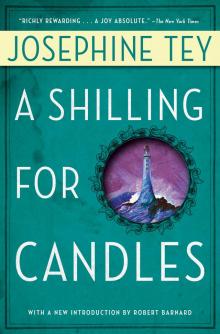 A Shilling for Candles
A Shilling for Candles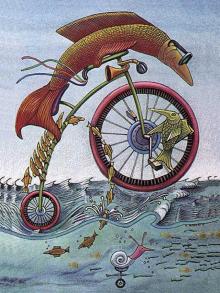 The Singing Sands
The Singing Sands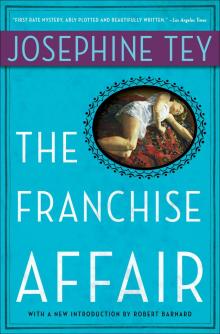 The Franchise Affair
The Franchise Affair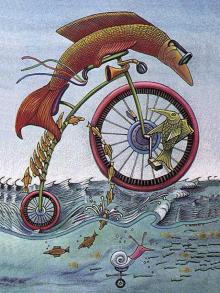 Daughter of Time
Daughter of Time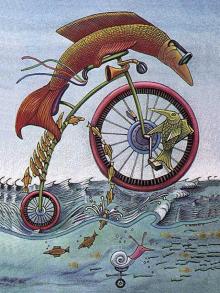 To Love and Be Wise
To Love and Be Wise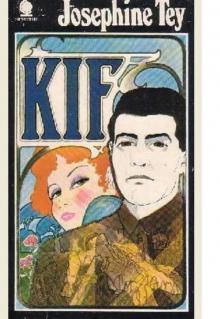 Kif
Kif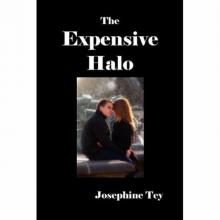 The Expensive Halo: A Fable Without Moral
The Expensive Halo: A Fable Without Moral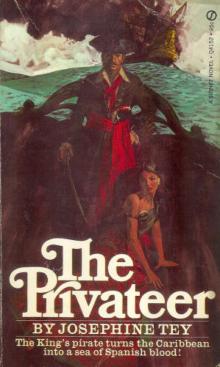 The Privateer
The Privateer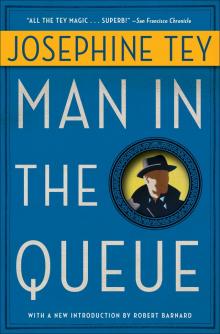 The Man in the Queue
The Man in the Queue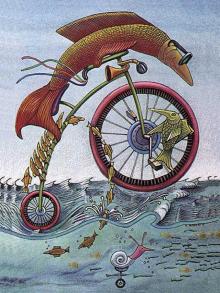 Miss Pym Disposes
Miss Pym Disposes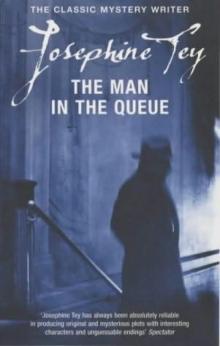 The Man in the Queue ag-1
The Man in the Queue ag-1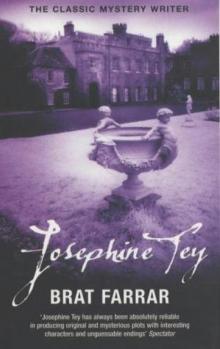 Brat Farrar
Brat Farrar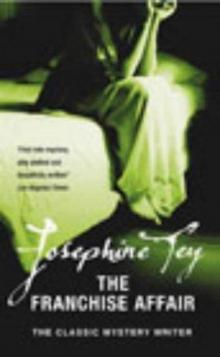 The Franchise Affair ag-3
The Franchise Affair ag-3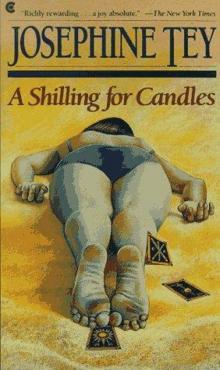 A Shilling for Candles ag-2
A Shilling for Candles ag-2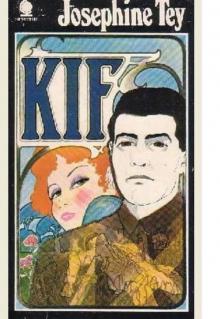 Kif: An Unvarnished History
Kif: An Unvarnished History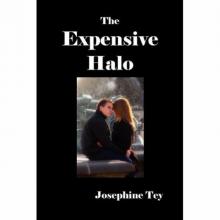 The Expensive Halo
The Expensive Halo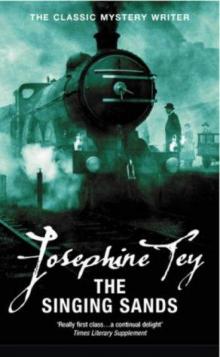 The Singing Sands ag-6
The Singing Sands ag-6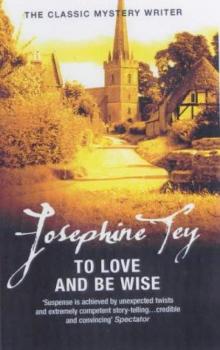 To Love and Be Wise ag-4
To Love and Be Wise ag-4